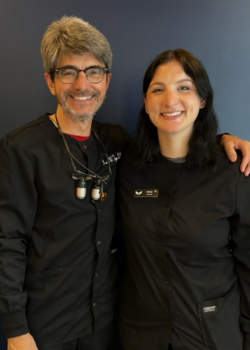Dentist buy-in crucial to dental assistant career growth

Although it’s about one person, career development is rarely a solo journey. It starts with an employee who is ambitious, willing to take initiative, and goal oriented. But a key ingredient in professional growth is support from others. For a dental assistant who wants to take the next step in their career, an encouraging, motivating doctor can make all the difference — and provide that extra push.
Molly McFarland, CDA, is proof of this. In 2022, she joined the private practice of Dr. Kevin Fryer in Mayfield Heights, Ohio. Shortly after, Fryer asked if she was interested in taking courses to become an expanded functions dental auxiliary (EFDA).
“I was scared, but I said yes,” shares McFarland. “And it was definitely one of the best decisions that I could have made.”
 As the owner of the practice for over 30 years, Dr. Kevin Fryer (left) quickly recognized Molly McFarland (right) was a valuable, talented team member and saw her potential to take on more responsibility. “I think one of my superpowers is knowing what people are good at and then really pushing them in that direction to get the most out of them,” Fryer explains. “And that helps our practice, it helps our patients, and it helps me.”
As the owner of the practice for over 30 years, Dr. Kevin Fryer (left) quickly recognized Molly McFarland (right) was a valuable, talented team member and saw her potential to take on more responsibility. “I think one of my superpowers is knowing what people are good at and then really pushing them in that direction to get the most out of them,” Fryer explains. “And that helps our practice, it helps our patients, and it helps me.”
As the owner of the practice for over 30 years, Fryer quickly recognized McFarland was a valuable, talented team member and saw her potential to take on more responsibility.
It’s an approach Fryer has taken with other employees on his team, as well. McFarland is one of two EFDAs in the office, and Fryer has also supported his dental hygienists in obtaining local anesthesia licenses. Ultimately, investing in professional development for his team has helped Fryer build a more successful practice.
“I think one of my superpowers is knowing what people are good at and then really pushing them in that direction to get the most out of them,” Fryer explains. “And that helps our practice, it helps our patients, and it helps me.”
The EFDA impact
McFarland immediately found her EFDA credential valuable because she could better understand the procedures and discussions happening every day in the office. As a result, she felt more assured of her knowledge and comfortable participating in those conversations with doctors and patients.
“It gave me a lot of confidence in the office just to be able to talk with the doctors and really know what I was talking about and to ask more advanced questions so I could learn more,” McFarland explains.
As an EFDA, McFarland can now help with fillings, crowns, dental implant surgery, and more. It has made her a critical member of her practice, which has been her goal since she began her career.
“All I’ve wanted to do since I started in dentistry is just help as much as I can,” she explains. “I think the best way to do that is just knowing more and being willing to learn.”
With a staff capable of handling expanded duties, Fryer can delegate as needed, freeing him up to spend additional time with patients, handle more complex procedures, and focus on one task at a time. Overall, his practice is more efficient and productive — without sacrificing patient care.
“In the past, if it was just me, I would be in the middle of this filling or whatever procedure, and then I had to go do a hygiene exam and my mind was in two places at once,” explains Fryer. “The hygiene patients are there for me, and if I can’t 100% be there, then that’s not great. Now, if everything is flowing the way it should be, I can get up and walk away and Molly takes over with the filling. I can spend longer with the patient discussing whatever procedures they need, elective procedures, or even asking ‘How’s your grandma? or ‘How’s your dog?’”
As a further sign of the trust she’s gained in the practice, McFarland also helps train new employees, freeing up additional time for Fryer to see patients.
“I don’t have to be as hands-on with every new employee because I can rely on Molly, or Sam, or Megan, or someone else,” Fryer elaborates. “Once the machine is in motion, it’s easier to keep in motion because I can rely on everybody else around me.”
Overcoming bumps in the road
The path to becoming an EFDA wasn’t always a smooth one for McFarland. She didn’t pass her final exam on her first attempt, which left her feeling discouraged. But Fryer didn’t lose any faith in her.
“There was a little bit of a roadblock with passing the test, and my opinion was, ‘So what? Let’s get you help for that,’” says Fryer. “When we take on a new endeavor like this, we sometimes make mistakes. Part of being the owner is trying to make an environment in which it’s safe to fail. That doesn’t mean putting a patient’s health at risk or anything like that. It’s just that we all make mistakes and, really, we learn more from those than most of our successes.”
Fryer enlisted the help of his wife, Missy — a director at Sylvan Learning Center — to assist Molly in studying. On her second attempt, McFarland passed and became an EFDA.
“When I passed my final and the state board, I cried because I was so amazed that I did that,” she shares. “And I just felt so much love from the people around me that supported me through all of it.”
To other dental assistants going through similar challenges, McFarland encourages them to stick with it.
“It’s OK to make mistakes,” she advises. “If I’m going to be honest, I filled a tooth in one of the classes, and I think I had to redo it about 25 times. I just had to keep going, and going, and going. And then on my final, I got 100% on it. So, if you become discouraged, that’s OK. Just don’t give up.”
Encouraging further support for professional growth
Earlier in his career, Fryer says he may not have embraced having EFDAs in his practice, feeling the dentist has to do everything.
“There was this famine mindset instead of an abundance mindset,” he explains. “My opinion on that changed because when we moved our practice to where it is right now, we inherited an EFDA, and I recognized that I could rely on this person [more].”
Fryer encourages other dentists and practices to take a similar approach toward development for their teams — especially if they’ve maxed out their productivity.
“To my colleagues out there, invest in your people,” Fryer encourages. “You can’t clone yourself. But what you can do is ‘quarter-clone’ or ‘third-clone’ yourself and delegate some of those responsibilities to someone else so that you can do bigger procedures and be able to produce more in your office.”
A culture of professional growth also helps create a more empowered, independent, and satisfied dental staff.
“I am extremely grateful that Dr. Fryer has given me this opportunity to be the best version of myself in the office and out,” says McFarland.

